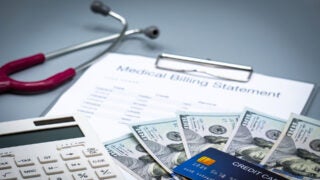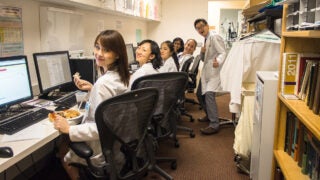Get the care you need during COVID-19, health experts urge
Delays in treatment for problems like heart attack or stroke could have serious consequences. Keck Medicine of USC joins other local nonprofit health systems to encourage people to seek help.
Patients with heart trouble and other common problems aren’t seeking care because they’re afraid of contracting the coronavirus. It has health officials at Keck Medicine of USC so worried that they’ve joined with other hospitals to encourage the public to seek out vital medical help when in need.
Emergency rooms and other health facilities across the nation have reported significant drops in visits for heart attacks, stroke and other serious conditions during the pandemic. Keck Medicine of USC’s hospitals and clinics are no exception.
“We’ve seen a huge downturn in those patients,” said Vivian Mo, a cardiologist with the Keck School of Medicine of USC and chief medical officer of USC Care Medical Group. “That’s not to say they aren’t having those acute medical issues. They are just choosing not to seek medical care due to fear of contracting COVID-19 if they were to visit an emergency room or hospital. I’m sure there are people dying in their homes from heart attacks or strokes when they could have been helped if they came to the ER.”
To encourage people to seek treatment, Keck Medicine joined five other nonprofit health systems in Southern California — Cedars-Sinai, Dignity Health, Kaiser Permanente, Providence and UCLA Health — to launch public service announcements. The outreach includes messages like “Get care when you need it” in multiple languages on television, radio, billboards, newspapers, magazines, social media and websites.
Those efforts are critical in addressing what health experts call a silent epidemic linked to a fear of COVID-19, even as hospitals go to unprecedented lengths to keep patients safe.
Research shows visits to emergency rooms are down nearly 50% since the onset of the pandemic, including a nationwide drop from 2.2 million weekly visits in mid-March to 1.2 million in mid-April. A study at a hospital in Northern California found a 45% increase in cardiac arrests that occurred outside of health care settings, indicating patients had waited too long to get help for heart problems. Other experts reported a 39% drop in people seeking treatment for stroke.
“It’s sobering,” said Shawn Sheffield, chief strategy officer at Keck Medicine. “And it’s much worse when you have a chronic disease or multiple conditions, because you really have to stay on top of managing your health.
“At Keck Medicine, it’s probably the safest time to come for a procedure in a hospital setting right now. We are taking many precautions to protect our patients and health workers.”
USC experts: Get medical care immediately for serious health issues
Heart attacks and strokes require immediate care to improve the chances of a full recovery, Mo said. She encouraged people who have symptoms like chest pain, shortness of breath, numbness or weakness in their arms and legs, or slurred speech to get help right away.
“If patients don’t have an urgent issue and would prefer to do a virtual visit, then that accommodation allows for adequate medical care as well as maintaining safety for the patient and the medical care provider,” she said. “But when patients have an uncontrolled chronic disease or health problems that appear to be more urgent, that’s when it gets dicey.”
Mo knows the telltale signs of heart failure. She’s a clinical associate professor who specializes in cardiology and directs the Women’s Cardiovascular Center of USC. When patients complain during phone or video checkups that their legs are swollen or they have intermittent chest pain, she encourages them to visit her office so she can assess their condition in person.
Heart failure is the top reason for hospital admissions, Mo said, and people who delay an outpatient visit could end up in a hospital bed with more serious health problems.
If I ask you to come in, it’s not for anything else but you and your health.
Vivian Mo
“Don’t put it off anymore, because the longer you are at home, you might be languishing there,” she said. “In some cases, I can’t help patients unless I physically see them. I’m very conservative and believe in keeping patients at home while we still have safer-at-home orders in effect, so if I ask you to come in, it’s not for anything else but you and your health.”
Delays in other critical health appointments also cause concern among medical professionals. Vaccinations for children plummeted after the COVID-19 outbreak, for instance.
Staying up to date on immunizations is essential to protect kids against infectious diseases. It’s something Mo takes seriously with her own family. Her daughter needs her two-year checkup soon, and Mo called her pediatrician to ensure they could still visit in person.
“I don’t want her to miss her shots,” she said. “But I do know there are parents who are frightened.”
USC health facilities ramp up safety, cleaning during COVID-19
To assuage fears about the coronavirus, USC health officials follow all county and state health guidelines and developed special regulations for their facilities.
Offices and entryways have been reconfigured to ensure social distancing. Cleaning crews disinfect all public areas throughout the day. Extended office hours ensure less crowding. Upon arrival, all patients and employees receive a face mask and have their temperature taken.
“When our patients come to the hospital or the clinic, they’ll see there is a path forward and everything will be OK,” Sheffield said.
Employees also can be tested for the coronavirus. All patients with COVID-19 and their dedicated health care providers are isolated from other patients and employees. And people getting surgery or another procedure must complete a COVID-19 test at least 72 hours before their appointment.
“This is a very safe place,” Mo said. “We’ve had no patient-to-provider transmission, no patient-to-patient transmission.”
USC hospitals and clinics reopen for more procedures, with strict safety guidelines
Like many health care providers, Keck Medicine postponed many patient visits and procedures at the onset of the pandemic. Those restrictions were necessary to ensure health workers had enough resources to care for people with the virus. Now health officials are confident they can take on more patients with other health needs.
Patients should feel comfortable coming back to these physical spaces at Keck Medicine.
Mo
“Although there has definitely been a deferral of care, in the last few weeks we’ve seen elective surgeries and procedures coming back,” Sheffield said.
More information about safety guidelines at Keck Medicine and how to reschedule exams and procedures is available online. Patients can also call 800-USC-CARE (800-872-2273) to ask about in-person or telehealth visits, including mental health support.
“We will still err on the side of caution if we can provide adequate care through telehealth, either by phone or video,” Mo said. “But patients should feel comfortable coming back to these physical spaces at Keck Medicine. If they don’t, that’s fine, and I would ask that they have a conversation with their physician about whether they should come in person.”



